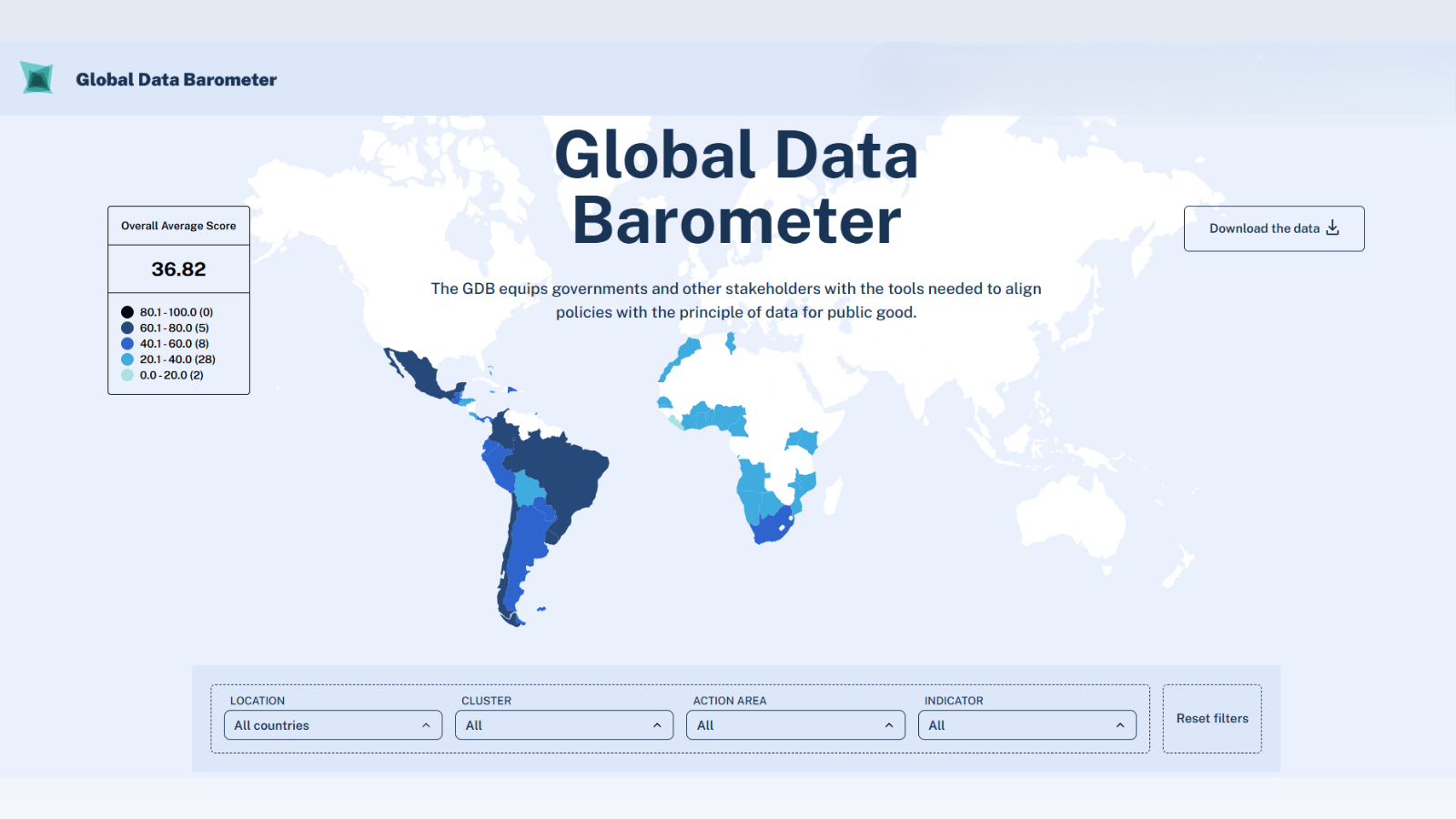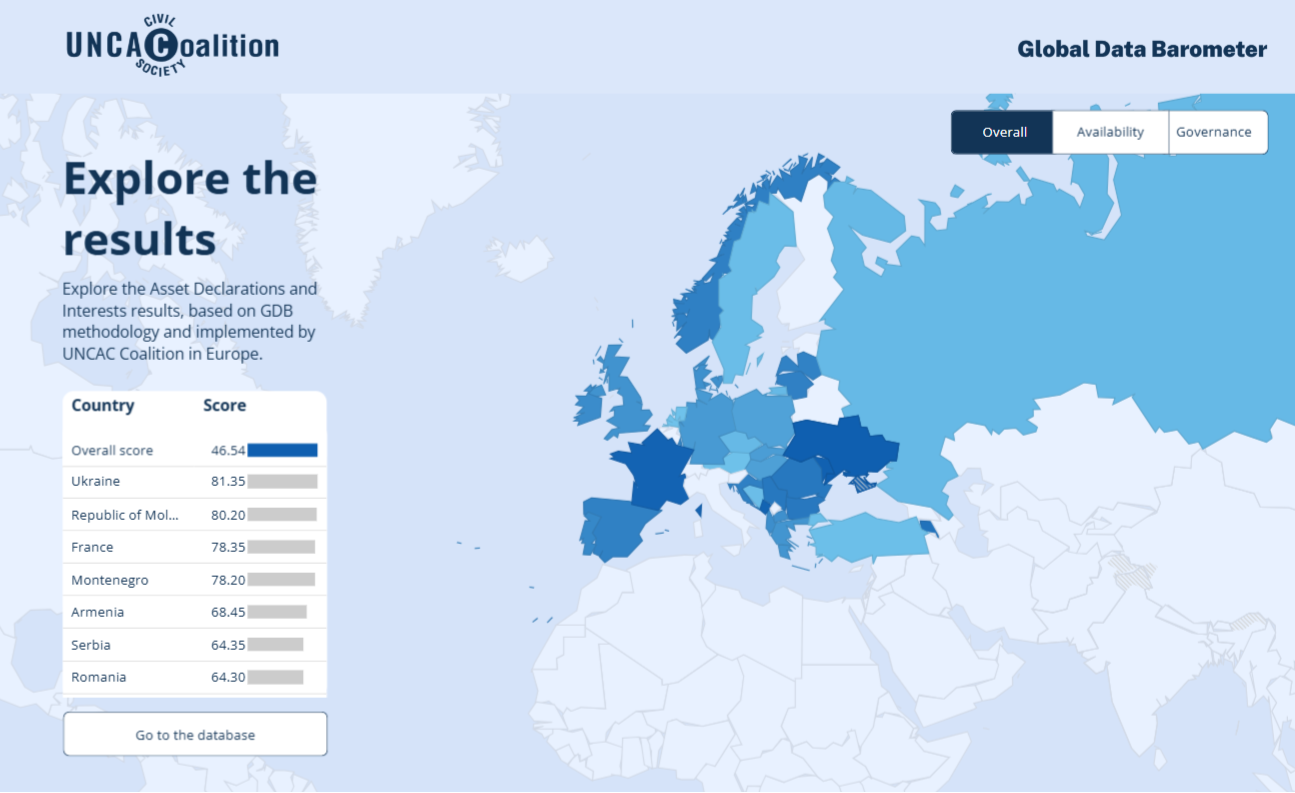Bridging the Transparency Gap: New evidence on interest and asset declarations
This blog was written by Silvana Fumega, Director of the Global Data Barometer and Ana Revuelta, Analyst and Regional Coordinator for Europe at the UNCAC Coalition.
In an era of declining public trust in institutions, Interest and Asset Declaration (IAD) systems have become critical tools for preventing corruption, detecting illicit enrichment, and promoting accountability. However, these systems are often underdeveloped and fragmented, or not publicly accessible, falling short of their potential to ensure integrity in public office.
On July 10, a webinar hosted by the Global Data Barometer (GDB) and the UNCAC Coalition brought together voices from Transparency International, the Open Government Partnership (OGP), and other civil society experts to examine the state of IAD systems globally and regionally. The event marked the release of new findings from 43 countries in Latin America, the Caribbean, and Africa. They were assessed through the GDB’s second edition and using their indicators, along with a complementary assessment of 33 European countries led by the UNCAC Coalition in collaboration with a number of organizations.
This shared effort not only expanded geographic coverage but also laid the groundwork for better cross-country comparability and joint advocacy.

Understanding IAD Systems: Their value and vulnerabilities
The discussion opened with Jon Vrushi, Lead on Political Integrity at Transparency International, who offered a clear framework for why asset and interest declarations matter and the key elements required to build robust systems: for IAD systems to be meaningful, they must go beyond symbolic compliance. Firstly, they require a legal basis and clear definitions. Secondly, they need to be comprehensive in scope. Thirdly, the data have to be verified by empowered oversight institutions. Finally, to help detect potential conflicts of interest or hidden wealth, asset and interest declarations should be published online in open, interoperable formats.
Vrushi noted that while international frameworks have defined global standards–like the United Nations Convention against corruption (UNCAC) in its Article 8 on codes of conduct, and the OECD guidelines on asset declarations of public officials–enforcement and accessibility vary widely at the national level.
“Transparency alone isn’t enough—we need actionable, high-quality data that can be cross-referenced and used by oversight institutions and civil society,” he said.
Findings from Latin America, Africa, and the Caribbean: Data exists but access doesn’t
Silvana Fumega, Director of the Global Data Barometer, presented key findings from the second edition of the Barometer. While most countries assessed have legal frameworks requiring declarations, implementation remains limited. Only a third of countries in Latin America, the Caribbean, and Africa publish any IAD-related data, and when they do, the information is often partial, outdated, or difficult to access.
She highlighted three systemic issues:
- First, the data lacks depth: non-financial interests such as unpaid roles and declarations by family members are rarely included.
- Second, updates are rarely required: declarations are left outdated once officials are in office.
- Third, data is often incomprehensible: even when published, it is typically not available in machine-readable or open formats, limiting its usefulness for oversight.
Nonetheless, countries like Brazil and Chile offer examples of more usable systems, providing structured, downloadable data through national portals.
“Understanding and improving IAD systems requires not just good data, but meaningful collaboration across regions, sectors, and disciplines,” Fumega emphasized.
Extending the Picture to Europe: A fragmented reality
As Ana Revuelta explained, Regional Coordinator and Analyst at the Coalition, the goal of assessing the IAD systems was to shed light on a region often assumed to be more advanced but still facing significant transparency challenges.
While most countries have legal frameworks on paper and might have online registers, few ensure that declarations are fully comprehensive and publicly accessible. For instance, information about gifts, or assets owned by spouses, family members and associates, is limited. Moreover, many portals require users to search by name instead of offering bulk downloads to access the entire dataset, which makes the search very difficult. Often, historical records are not preserved to track change over time; or the declarations are removed once the public official leaves office.
“The results show that no European country meets the highest standards of openness, completeness, and reusability of the information contained in the declarations”, concluded Revuelta.
In this context, many countries show good practices -like Moldova, Ukraine, France, Armenia, Montenegro and others- but even these have gaps: no systematic verification of the data, no possibility to know if some declarations are missing, or profiles of family members are not linked to the corresponding public official.
The Coalition’s new interactive dashboard on asset and interest disclosure in Europe presents a picture of the transparency levels in financial disclosure across countries. It links directly to the relevant databases of asset and interest declarations in each country, offering a platform for civil society organizations and journalists interested in using the registers in their investigative work.

From Data to Reform: The role of political will
While data reveals gaps, reform depends on political will. Renzo Falla from the Open Government Partnership emphasized that only a small number of OGP members are currently advancing IAD reforms, even though such commitments are often well designed and ambitious.
Still, there are encouraging examples:
- Liberia is digitizing declarations and building an open data portal.
- Ghana and Senegal are expanding legal requirements and introducing sanctions.
- Chile is broadening the scope of asset types to be declared.
- Mexico is addressing gaps in coverage for legislators and officials’ families.
Despite these efforts, fewer than 10 percent of OGP members currently include IAD in their action plans. According to Falla, more reformers are needed.
“We need coalitions to push these reforms forward and to protect them when political winds shift,” he said.
Looking Ahead: Advocacy, alignment, and action
Throughout the webinar, participants highlighted the critical role of civil society in driving transparency, whether through investigations, legal advocacy, or connecting IAD data to other open datasets like procurement or beneficial ownership.
As anti-corruption expert and former judge Tilman Hoppe shared, Moldova’s experience shows that even basic declarations can become powerful tools when paired with mechanisms like judicial vetting and sustained oversight.
Concrete opportunities for advocacy were identified, including promoting standards in the ongoing EU Anti-Corruption Directive negotiations, influencing discussions at the upcoming UNCAC Conference of the States Parties (CoSP11) in December, and encouraging action through OGP’s Open Gov Challenge.
In closing, Silvana Fumega reminded participants of the broader purpose behind these initiatives.
“Improving IAD systems isn’t just about making data public—it’s about ensuring that data can be used to strengthen democracy and build trust.”
The findings shared in this webinar highlight the urgent need for global alignment, stronger commitments, and tools that work in practice. With evidence, collaboration, and public pressure, transforming interest and asset declaration systems into engines of accountability is within reach.
